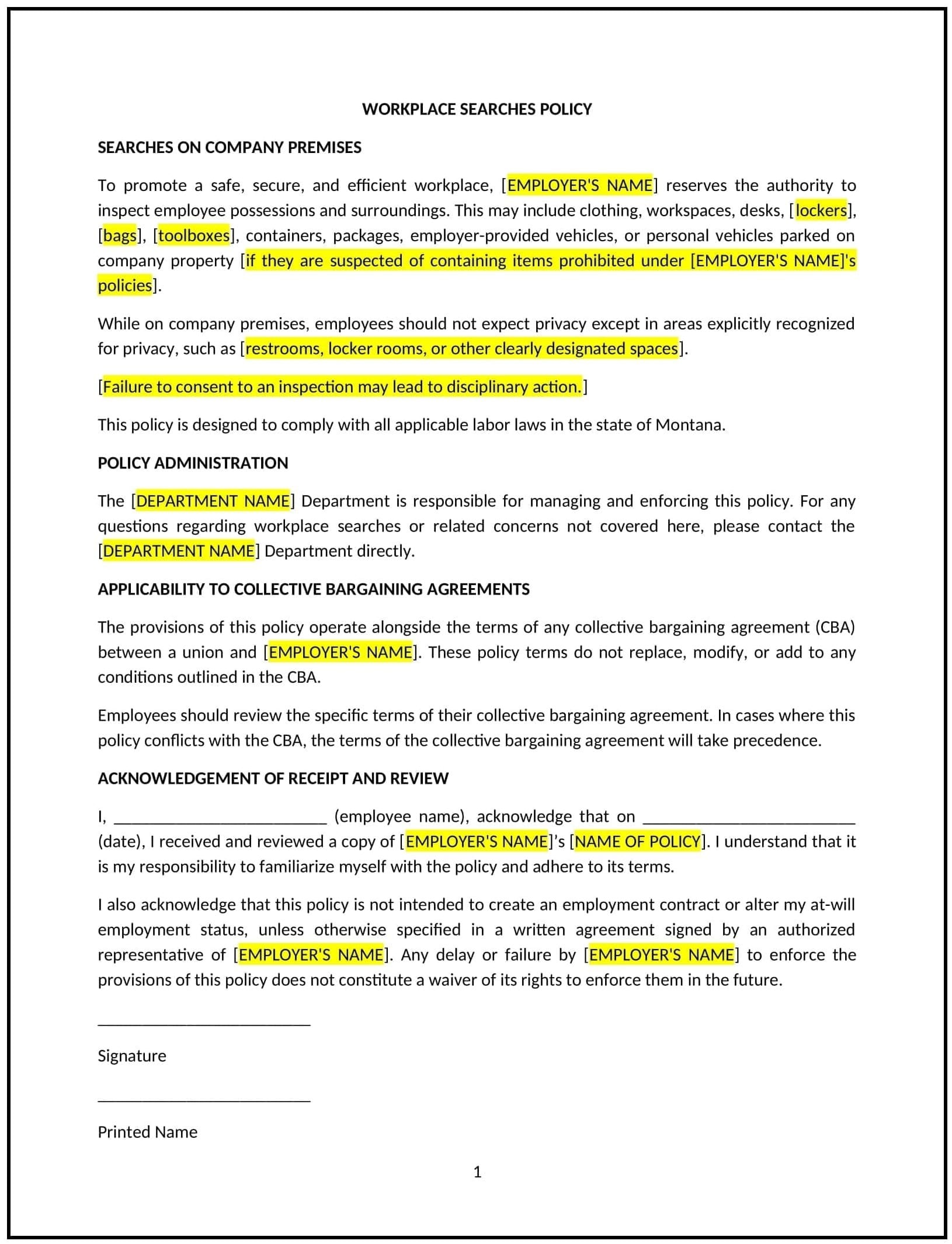Got contracts to review? While you're here for policies, let Cobrief make contract review effortless—start your free review now.

Customize this template for free
Workplace searches policy (Montana)
A workplace searches policy helps Montana businesses establish clear guidelines for conducting searches of employees, their belongings, or company property. This policy defines when searches may be conducted, the procedures to follow, and the rights of employees regarding privacy and consent. It is designed to protect company assets, maintain a safe work environment, and ensure that searches are conducted fairly, consistently, and legally.
By implementing this policy, businesses can safeguard their interests while respecting employees' rights and privacy, fostering a transparent and secure work environment.
How to use this workplace searches policy (Montana)
- Define when searches are permitted: The policy should specify the conditions under which searches may be conducted, such as when there are reasonable grounds to suspect theft, possession of illegal substances, or violation of company policies.
- Set clear procedures for conducting searches: The policy should outline the process for conducting searches, including who is authorized to carry out the search, where searches will take place, and the involvement of witnesses. It should also specify the types of searches allowed, such as personal bag searches, desk or locker inspections, or vehicle checks.
- Address employee consent: The policy should explain whether employee consent is required for searches, and under what circumstances consent may be implied (e.g., when entering company premises). It should also specify that searches will be carried out in a respectful and non-invasive manner.
- Establish guidelines for confidentiality: The policy should state that all searches will be conducted discreetly, and that the results of the search will be handled confidentially. It should emphasize that information obtained during a search will only be shared with relevant personnel.
- Define consequences for refusal to comply: The policy should clarify the potential consequences if an employee refuses to submit to a search when requested, which could include disciplinary actions or suspension.
- Review and update regularly: The policy should be reviewed periodically to ensure that it is in line with current laws and regulations, as well as the company’s evolving security needs.
Benefits of using this workplace searches policy (Montana)
This policy provides several key benefits for Montana businesses:
- Protects company assets: Regular searches can help prevent theft or unauthorized use of company property, including sensitive information, equipment, or supplies.
- Maintains a safe work environment: By allowing searches when there are reasonable grounds, businesses can address potential security threats, such as the presence of drugs, weapons, or other prohibited items, helping to ensure the safety of all employees.
- Promotes transparency and fairness: Clear guidelines for searches ensure that all employees are treated equally and that searches are conducted fairly, without discrimination or favoritism.
- Reduces legal risks: A well-defined search policy helps businesses avoid legal challenges by ensuring that searches are conducted in accordance with privacy laws and regulations, minimizing the risk of violations or complaints.
- Enhances employee trust: A policy that is applied consistently and transparently can help foster trust between employees and management, as it shows that the company is committed to maintaining a secure and respectful workplace.
- Improves workplace culture: A clear and fair search policy can reduce misunderstandings and conflicts, creating a more harmonious and productive work environment.
Tips for using this workplace searches policy (Montana)
- Communicate the policy clearly: Ensure that all employees are aware of the workplace searches policy, including when and why searches may occur, who is authorized to perform them, and the consequences of refusing to comply. This information should be included in the employee handbook and shared with employees during orientation or training.
- Apply the policy consistently: The policy should be applied consistently to all employees, regardless of their role or position. This ensures fairness and prevents any perceptions of bias or discrimination.
- Handle searches discreetly: Whenever possible, searches should be conducted in private to protect employees' dignity and minimize any potential embarrassment. Ensure that all involved parties understand the importance of confidentiality.
- Train employees and supervisors: Ensure that both employees and supervisors are trained on the proper procedures for searches, how to handle difficult situations, and how to address potential privacy concerns.
- Monitor compliance: Regularly review search practices to ensure they align with company policies and legal requirements. Make adjustments as needed to maintain a respectful and legally compliant approach.
- Review the policy periodically: The policy should be reviewed at least annually to ensure it remains relevant to business needs, complies with evolving laws, and reflects best practices for managing workplace security.